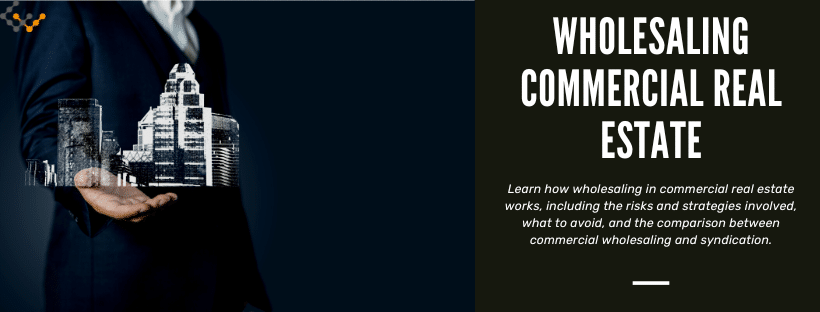A Guide to Wholesaling Commercial Real Estate

Wholesaling commercial real estate lets knowledgeable investors leverage their expertise more than their capital. This is a proven and long-established commercial real estate investment strategy, one that can be especially useful for investors who don’t want to risk large amounts of capital.
What is Wholesaling in Commercial Real Estate?
A commercial real estate investor who wholesales essentially acts as a middleman (or person). They find properties that are priced below market value and then enter into a contract for a chosen property. Before closing on the property, however, the wholesaler finds an end buyer to assume the purchase.
The profit a commercial real estate wholesaler makes stems from the spread between the contract with the seller and the contract with the end buyer. Sellers add a premium onto the price in the contract that’s negotiated with the end buyer.
The wholesaler themselves actually never assumes ownership of the property, instead securing an end buyer before the closing date.
Answer a few questions and get custom mortgage quotes. We'll match you with offers from our network of 650+ lenders.
Why Wholesale Commercial Properties?
The primary reason to wholesale commercial properties lies in how little capital is required. Since wholesalers do not purchase the property themselves, they do not need significant capital. In many cases, the only funds a wholesaler actually risks are whatever escrow is for a property purchase agreement.
Some investors also like the wholesaling approach because it’s less time-consuming than traditional real estate investments. While finding undervalued properties takes time and patience, the work isn’t as complex or extensive as running a commercial property is.
The shorter timeframe also fits with some investors’ time horizons. Few commercial real estate investment strategies have a comparably short horizon.
Finally, investors who have particular knowledge about a market and are well-connected may find specific opportunities that are well-suited for wholesaling. Even if these investors are already involved in other properties, they might quickly wholesale the occasional property for a quick return.
Risks of Wholesaling Commercial Real Estate
The most obvious and most serious risk involved with wholesaling commercial properties is the possibility of not finding a buyer before a property purchase contract expires.
Failure to secure an end buyer can leave the wholesaler in a lurch. The wholesaler will almost certainly lose the escrow amount, and they could be sued for other damages. While the wholesaler could technically purchase the property, few want to and some might not be able to.
Market volatility is another risk that wholesalers must consider. Sudden drops in property values can leave wholesalers locked into a contract that no end buyer will pay more than. Quick increases in property values may not yield higher returns, as wholesalers might already have a contract with an end buyer.
Seeking profit from the spread between one contract price and another’s is wholesaling. Seeking profit from anticipated market volatility is speculating.
How Do You Wholesale Commercial Real Estate
The process of wholesaling commercial real estate involves the following steps:
- Find and evaluate a property
- Enter into a limited partnership with the seller
- Put down escrow
- Secure and sign an end buyer
- Ensure the end buyer closes on the property
A limited partnership lets wholesalers structure these deals while limiting their risks. There are other ways that wholesale agreements might be structured.
Strategies to wholesale commercial real estate
- Analysis: Wholesalers must be able to conduct in-depth market analysis, and it helps to have specific knowledge of a certain market. Developing a knowledge of a local market can be helpful, and learning to analyze properties is essential.
- Search: While wholesalers should use online commercial real estate listings, the best deals are sometimes found before they even get listed. Part of searching for a property should include exploring what opportunities might be in a local area and not listed yet. This could require staying current on local news, networking with residents and business owners, and simply driving around to see properties.
- Networking: Being a wholesaler is as much about properties as it is about people. It’s essential to be well-connected, including with property owners, property investors, real estate professionals, and others in the industry. The more people a wholesaler knows, the better their chances of finding sellers and buyers.
- Marketing: Once a property is under contract, the wholesaler must then successfully market it to potential end buyers. A knowledge of online marketing and real estate marketing tactics is extremely helpful.
- Negotiating: Every real estate investor can improve their success if they negotiate deals well, but that’s doubly true for wholesalers. Wholesalers don’t just negotiate one contract — but one with a seller and one with an end buyer — for every deal they do. Being able to negotiate could be the difference between successfully doing this, and just eeking by.
- Legal: The deals that wholesalers make are more complex than standard commercial real estate transactions. If wholesalers themselves don’t have legal expertise in this area of real estate, they should at least have an attorney who specializes in these deals.
What Should You Avoid When Wholesaling Commercial Real Estate?
When wholesaling commercial real estate, it’s essential to avoid overestimating a property’s value. Overestimating properties when making other types of real estate investments can lead to reduced yields. Overestimating when wholesaling can leave you in a contract that you must break, which can come with immediate and severe costs.
It’s also advisable to avoid properties with complications other than maintenance and repair. Many wholesalers successfully turn distressed properties. Legal complexities, however, can slow the sale process down.
Even moderate legal issues might prevent a deal from closing before the wholesaler-seller contract expires. The most important thing is to be able to find an end buyer within the required timeframe.
Commercial Wholesaling vs Syndication: Which Investment Strategy Should You Choose?
Commercial wholesaling is a short-term strategy whereby investors use their expertise to make a profit.
Commercial real estate syndication is a very different investment strategy, where investors purchase fractional shares of a property or portfolio. The property is owned by the group and managed (usually by a syndicator), and each investor has a portion of shares.
Syndication is a passive way to diversify with commercial real estate. Wholesaling is an active, albeit not intense, way to make short-term profits if you have expertise and connections. Which is best depends on the individual investor.
Wrapping Up
Wholesaling in commercial real estate presents an intriguing opportunity for investors who want lower requirements and shorter investment terms. If you have knowledge of commercial properties and know others in the industry, this could be a successful investing strategy for you.

